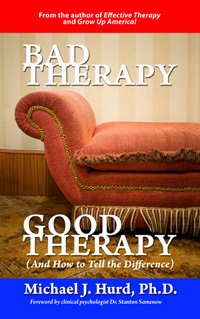
Dear Dr. Hurd: Can you offer any advice on how to find a rational therapist in my area?
Dr. Hurd’s reply: The complete answer to your question is found in my book, “Bad Therapy, Good Therapy (And How to Tell the Difference.)”
Here’s the abbreviated, “CliffsNotes” version:
Find a therapist who converses with and talks back to you — not someone who merely listens and asks, “How does that make you feel?”
Find a therapist who is willing to shine the light of reason/facts/logic on your emotions.
Find a therapist who is not interested in telling you what to do; but who is definitely interested in helping you find intelligent answers and solutions.
Find a therapist who does not immediately or exclusively talk to you about needing medication.
Find a therapist who speaks in “plain English,” not in overly technical terms he or she is unwilling to explain, and definitely not in psychobabble clich. Always remember that those who understand what they’re talking about don’t need the buzzwords of the day; they only need concepts grounded in facts. Those who understand what they’re talking about are always both willing and able to explain.
Find someone who’s a good listener and who’s patient.
Be willing to put time into this. Research online and see if you can find a therapist who has a website with either a blog or published articles and/or books. In this day and age, that shouldn’t be so unusual or difficult. You want to know something about how the therapist you’re hiring thinks — including whether he or she even thinks at all. If you hire a therapist who thinks thoughts or has ideas that make no sense to you, these are the thoughts and ideas the therapist will be trying to put into your head. It’s not going to work.
Don’t emphasize labels. A cognitive-behavioral therapist is usually the best kind, but not all who label themselves that way really know what they’re doing. A cognitive-behavioral therapist is a start, but not enough. That’s why I’m saying you’ll have to spend some time on this.
Keep in mind that you’ll probably need one or several sessions with a therapist before you can know for sure. If you somehow do know the therapist meets all your criteria even before you start therapy, it still will take a few sessions (or at least one) for you to establish if this is someone with whom you can speak openly and comfortably.
Look for someone who wants to understand your strengths, and who wants you to know you have strengths and potentialities. I heard recently about a therapist who left the client with an impression she was on the witness stand, being interrogated to find out what was wrong with her. No word, thought or comment of the therapy client/patient was to be trusted. Behind every word, thought or feeling lurked some deep, dark mystery that proved the need to spend a life in endless turmoil with depravity to be found around every untold corner. Such an experience says more about the therapist than anything else. It’s frankly creepy.
Bad therapy is worse than no therapy at all. As with all relationships in life, surround yourself only with nontoxic, positive, realistic and uplifting people.
For more details and the full story, check out my book.
Be sure to “friend” Dr. Hurd on Facebook. Search under “Michael Hurd” (Rehoboth Beach DE). Get up-to-the-minute postings, recommended articles and links, and engage in back-and-forth discussion with Dr. Hurd on topics of interest.
